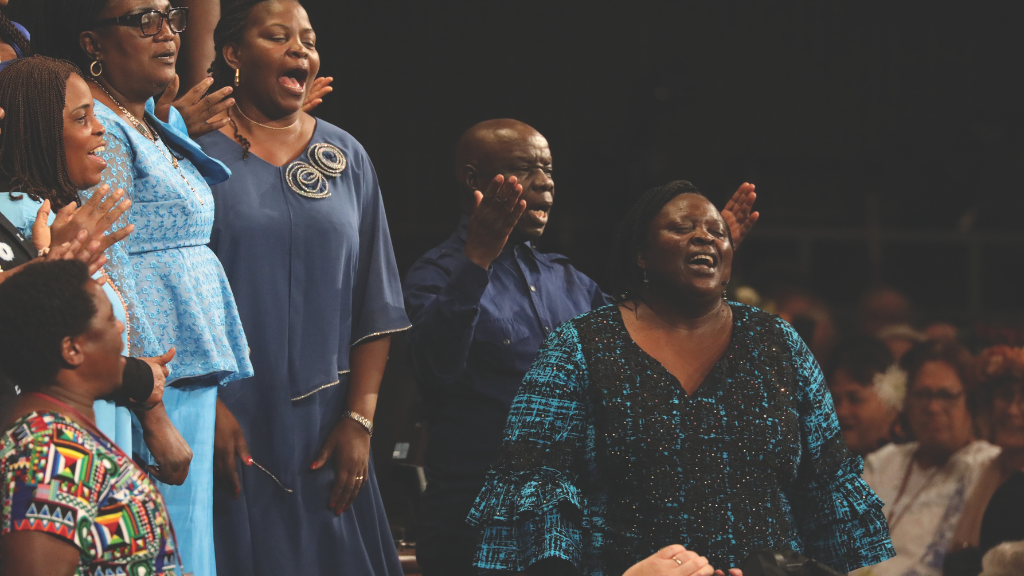
Since the introduction of Community of Christ Sings in 2013, “For Everyone Born,” has been embraced by local and international gatherings throughout the church. Feedback has included how much the text resonates with the Enduring Principles and how interesting and fun the tune is to sing.
There have even been camps that created actions to go with the words of the refrain. Some say that “For Everyone Born” has taken its place alongside “The Spirit of God like a Fire Is Burning” (CCS 384) as the two most-sung anthems of the church.
This hymn strongly resounds with the enduring principles of the denomination, created by an international council representing its global membership.
Lauren Hall, administrator of our hymnal project, wrote an article in the Hymn Society’s journal, The Hymn, about our plans to include the song in our 2013 hymnal and the important discourse that accompanied the hymnal team’s decision. She reported:
This hymn strongly resounds with the enduring principles of the denomination, created by an international council representing its global membership. Ironically it also ignited a struggle over its very inclusion in the collection.
In all the compelling and powerful ways this text speaks to us, it also triggers emotional reactions and can be difficult to sing. In particular, stanza four sparked robust debate in the selection process. The file is thick with wide reviews from various sources and feedback from counselors, social workers, and pastors over the tensions between seeing the ideal of Christ’s teachings of reconciliation and wholeness and the realities of extreme sexual abuse and pastoral care.
When asked whether she foresaw challenges for congregational singing, the late Shirley Erena Murray wrote to Hall:
I wrote the “tough” verse 4 because I knew, under the manifesto of Jesus, that even the worst abuse has to be dealt with and faced, and forgiveness requires singing about [it] here. Of course, I have had much reaction to this—personal stories of terrible pain and lifelong trauma from all kinds of abuse. [If] the verse is omitted...it destroys the architecture of the text. Sometimes, perhaps less often, it is welcomed as exposing and recognizing wounds that seem impossible to heal.
The 2013 hymnal team went full circle regarding the song’s inclusion. One pastor reflected:
I have reversed my thinking about this hymn, thanks to a wonderful discussion we had during the adult class at my congregation. I set the stage by opening a discussion of what purpose hymns play in worship and how we sing our theology. From a pastor’s view, we should not just sing songs that make us comfortable…[but] because it is right and calls us to live up to Christ.
Though we may not always find ourselves able to sing the fourth stanza because of strong emotion and tears, it remains something to strive for.
I wrote the ‘tough’ verse 4 because I knew, under the manifesto of Jesus, that even the worst abuse has to be dealt with and faced, and forgiveness requires singing about [it] here.
In a later version of the hymn published in Murray’s collection, “A Place at the Table” (2013), she added a stanza affirming the right of “the gay and the straight” to equal recognition:
For gay and for straight, a place at the table,
a covenant shared, a welcoming place,
a rainbow of race and gender and color,
for gay and for straight, the chalice of grace…
© Hope Publishing Company, Carol Stream, IL 60188. Used by permission.
This stanza came too late to be included in Community of Christ Sings but can be used with permission from Hope Publishing Company or under the OneLicense.net umbrella license.
The repetition of “for gay and for straight” emphasizes the importance Murray attaches to this. She wrote to Hall:
…in places where exclusion by the Church is a source of injustice and pain, as with the gay and lesbian communities, it [this hymn] has been used to ask for a place at the table, along with every other believer.
Again, when sharing about the creation of this hymn text, Murray wrote:
I selected the areas of injustice which directly affect women, children, and the elderly—always the first casualties of discrimination, poverty, or war. I leave it to the singer to imagine other forms of discrimination. And it became clear that no amount of writing about people’s rights will ever be effective if the supreme component of forgiveness, which creates understanding and compassion, is not there. …I hope that, as you sing this [hymn], you find yourself speaking out for anyone excluded from having a voice at the table of decision-making on grounds of gender, age orientation, or race. It seems we still need to do this!
For gay and for straight, a place at the table, a covenant shared, a welcoming place…
May we sing this beloved song with full intention and conviction toward a place of unconditional inclusivity.
Parts adapted from Lauren Hall, “For Everyone Born, a Place at the Table,” The Hymn 63/3 (Summer 2012), pages 42-44.

